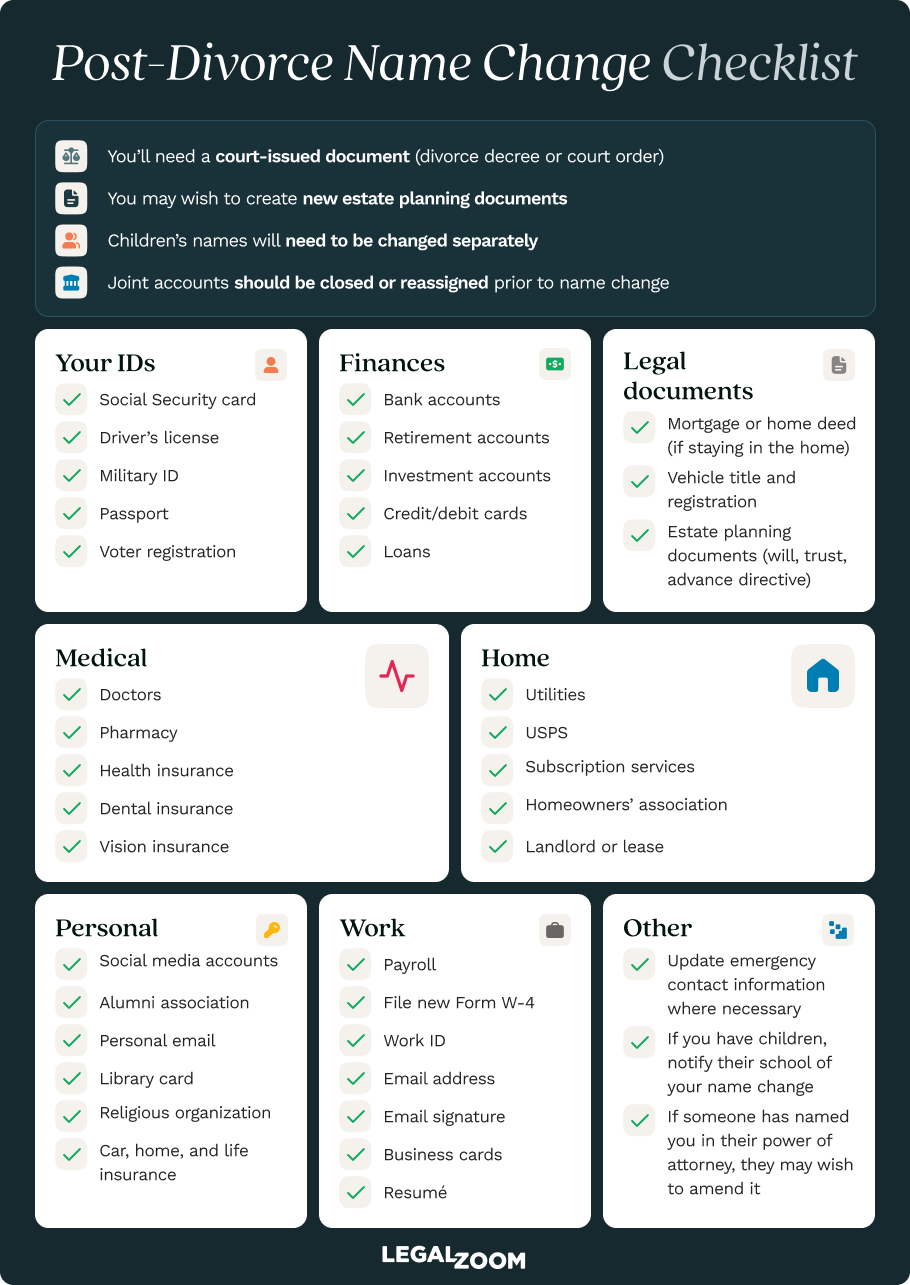Common reasons to legally change your name include marriage or divorce, gender identity change, adoption, and personal preference. But no matter your reason, you'll have to first start by making a legal name change request.
In this article, we'll explain the detailed processes for legally changing your name to a new name and the steps for getting a name change order.
Once you do submit your formal name change request and officially change your name, there is a long list of people, entities, and other institutions to contact with the new information to make sure the change is complete, legal and valid.

How to change your name after marriage
To change your name after marriage, file your marriage certificate with your local marriage office (typically the county clerk), then use certified copies to update your Social Security card, driver's license, and other documents. Your marriage certificate serves as legal proof of the name change, so no court petition is required.
You may change your first name, middle name, and/or last name to a new name or names. Note that you can change your title (for example, Mr., Ms., or Mrs.) at any time you want since it is not a legal designation.
To start, make sure that you and your partner are married by someone fully authorized to perform marriage ceremonies in your state. This is necessary for your marriage certificate to be considered valid.
Once you and your partner have both said "I do," file your marriage certificate with the local marriage office, normally at the town hall of the county in which you were married. There, you can request one or more copies of your marriage certificate to keep for your records.
In most cases, this filing counts as your legal name change. So, when you go to update or modify these certain accounts, your marriage certificate will serve as proof of the name change:
- Government records and IDs
- Bank accounts and credit cards
- Insurance policies
- Employment records
If you and your spouse want to adopt an entirely new last name or hyphenate your names, each spouse must file a formal name change petition with a local court.
It is important to understand that if your marriage ends, your name remains the same unless you take steps to change it.
How to change your name after divorce
Similar to how a marriage certificate serves as proof of a name change, a divorce decree is also typically considered proof of the same.
It's important to note, however, that you should include a request to revert to your pre-marriage name in your divorce petition. This request is a simple process during divorce, but failing to take care of it until after the divorce has been finalized can complicate the issue. If you forget or fail to include such a request in the divorce petition, you may be required to file a second court petition to change your name.
Once the divorce has been finalized, make sure to request a certified copy of your divorce decree to serve as proof of your name change when trying to update paperwork.
Using your divorce decree
Once the divorce is concluded and your state's court has issued the divorce judgment or divorce decree, you will then use that document to legally change your name elsewhere as part of your name change process.
If you changed your name when you married, your birth certificate was not altered. Therefore, when you get divorced, you do not need to make any changes to your birth certificate.
When Can You Change Your Name With a Divorce?
Changing your name after divorce is entirely optional. Some parents choose to keep their married name to match their child's name. Your former spouse does not need to give permission for you to change your name.

How to change your name with a court order
To change your name via court order, you must file a name change petition with your local court, attend a hearing, and receive a court order approving the change. This process is more involved than a marriage or divorce name change but follows predictable steps.
Step 1. Gather, complete, and file name change petition forms with the court
These forms vary depending on your home state and even jurisdiction, but they can almost always be found on your local courthouse's website. Filing usually involves a fee ranging from $100 to $500.
- Fee waiver option: If you can't afford the filing fee, you may request a need-based fee waiver from the same courthouse.
Step 2. The court in which you filed your petition will set a date for a brief court hearing.
The timeline for this hearing depends on the court's availability, so prepare to wait weeks or even months.
- Public notice requirement: Many states require you to publish a notice in the local newspaper announcing your intended name change. This allows anyone with an objection to appear in court.
Step 3. Appear in court and explain your decision.
Unlike marriage or divorce, courts require you to explain your reason for the name change. Come prepared with supporting documents, such as:
- A background check (proving you're not avoiding debts or criminal charges)
- Photo identification
- Your completed petition and any required forms
Once these three main steps are done, you can request court papers to serve as proof of your court-ordered name change. It's always best to request multiple copies of these papers, as they'll be used to modify legal documents later on, such as your birth certificate.
How to change a child’s name
If you want to change your child's name, you must file a petition in court. Both parents must agree, or a judge must approve the change through an ex parte application.
After a divorce, a parent may want the child to take a step-parent's last name. This requires consent from the other biological parent.
Changing a child's name involves elements of both the marriage or divorce methods and the court-ordered process. That said, it can be even more complex than trying to change your name after a gender change or other personal matter.
Step 1. Include a name-change request in the petition for adoption.
Though it's possible to change a child's name after an adoption is finalized, it's always better to start the process when you initially file the petition. When you do, include your reasons for wanting to change the child's name and, if it’'s not a closed adoption, written consent from the biological parents.
Step 2. Notify the court and all involved parties.
When you do so, the court will set a hearing date for everyone involved in the adoption to appear and argue their cases. While this process is amicable in most adoption cases, it's legally required to give proper notice to previous guardians and other invested parties.
Step 3. Attend the child's adoption hearing.
For this step, make sure to bring all necessary documents related to the adoption, such as the adoption petition itself and any social services records that support your decision to adopt. Though you should always be prepared to defend the name-change request, this is almost always honored during the adoption process.
After the hearing is over, the final adoption decree should include the approved petition for a name change. Just like with any other method of legally changing your name, make sure to order and keep multiple copies of these records.
Next steps after your legal name change
After you've finalized your name change and received proof, you'll need to update your identity documents. For a comprehensive guide, see our name change checklist. Here are the main steps:

Step 1: Update your Social Security card
With few exceptions, your Social Security card should be one of the first things you update following a legal name change. Often, this will be the document that the IRS and other government agencies require when updating other records.
To do so, download, complete, and submit Form SS-5 on the Social Security website. This takes a few weeks to process, after which your information will automatically be updated within the government system.
Step 2: Get a new state ID or driver's license
After you've gotten your new Social Security card squared away, it's best to obtain an updated day-to-day form of identification, such as a driver's license or state ID card. This can typically be done at your DMV, though you should check state regulations to make sure you have the documents needed to make the change.
Step 3: Notify the IRS
By updating your Social Security information, the IRS will automatically associate your Social Security number with your new legal name. When you next file taxes after the name change, make sure to use your new name.
That said, you should make sure that your employer updates your W2 and payroll information to reflect the name change. If they don't, the IRS may take issue with any discrepancies between income reported under your old name and the new name they now have on file.
Step 4: Renew voter registration
Although not technically a form of identification, most people will want to update their voter registration forms to make sure they can vote without issue when the time comes. Again, this process varies by location but can almost always be accomplished online.
Step 5: Change bank accounts and credit cards
Because banks and credit agencies rarely account for name changes automatically, you'll need to contact them to change the official names on your accounts. Doing so early on can prevent problems with your credit score or payment methods.
On a related note, it's typically wise to update your name on loans and other financial agreements for reasons similar to those involved with bank accounts.
Step 6: Inform insurance agencies
In order to ensure the continuity of coverage, contact your health, dental, vision, and life insurance agencies to update your name in their records and receive new insurance cards, where applicable.
Step 7: Update estate plans
An oft-overlooked type of document following a legal name change is an estate plan. Once you've legally changed your name, take the time to go back and update your will, any trusts you maintain, your power of attorney, and your advance directive. This will help your beneficiaries avoid any extra legal challenges in the event of your death.
How a name change lawyer can streamline the process
No matter what your reason may be for changing your legal name, it can be a challenge to navigate all of the legal processes involved. To help, many lawyers offer a flat, one-time fee to help you prepare for any court hearings, draft petitions, and even make sure that all of your legal information is properly updated after the fact.
If you're struggling with the process or just want to make sure it's done—once and for all—consider reaching out to an experienced name change attorney for help.
Name change FAQs
How much does it cost to change your name?
For both marriage certificates and divorce decrees, the name change cost is included in your filing fees. Court-ordered name changes typically cost $100 to $500, depending on your state.
Do I need to update my birth certificate if I change my name?
If you change your name during marriage or divorce, you won't need to update your birth certificate. If you perform a name change via court order or during adoption, however, you'll likely want to file for a new birth certificate for you or your child that reflects the most current name.
How long does the name change process take?
Marriage and divorce name changes take effect once your certificate or decree is filed. For court-ordered name changes, the process involves gathering documentation, filing a petition, setting a court date, appearing in court, and receiving official documents—all of which can take weeks or months, depending on court availability and state requirements.
Do I need a lawyer to change my name?
In most marriages or divorces, you likely won’t need another lawyer to change your name. For court-ordered changes, adoptions, or complex situations, an attorney can simplify the process.

